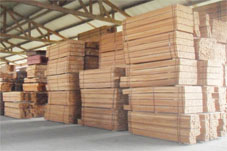Stakeholders in the local forestry sector are to make a submission to local commercial banks that could determine whether or not the industry secures the financial support it desperately needs for recapitalization, President of the Forest Producers Associa-tion (FPA) Hilbertus Cort has told the Stabroek Business.
The submission, which Cort says could be made as early as next week, arises out of a meeting between the banks, forestry sector investors, the Forest Products Marketing and Development Council, (FPMDC) the Guyana Manufacturing and Services Association (GMSA) and the FPA held on Monday. Mining and Environment Minister Robert Persaud was also present at the meeting. The Guyana Bank for Trade and Industry, Demerara, Scotia and Citizens banks were also represented.
The submission to the banks is to be made through the local Bankers Association and Cort said it will draw on presentations made at the meeting by the various stakeholders as the industry seeks financing to support what FPA Executive Member Reginald Manbodh says is a “crisis” facing the sector.

Asked to assess the extent of the crisis, Cort said that the costs associated with what needs to be done to recapitalize and modernize the sector could run into “hundreds of millions of dollars”. It was, he said, “a question of modernizing critical equipment including machinery, which can be described as ancient.”
The banks’ consideration of the financial requirements of the forestry sector could take account of Timber Sales Agreements (TSAs) being held by some concessionaires, which allow for long-term harvesting of between 15 and 25 years. Senior Vice President of the FPA Khalawan told Stabroek Business that the TSAs, which were first issued in 1985, had, in the past, been used to secure financing from GAIBANK. They might now be accepted by commercial banks in consideration of long-term financing, he said. Valuation of standing stock could also be used as a determinant of the creditworthiness of timber harvesters.
According to Cort, the problems faced by local investors in their quest to raise capital had resulted in a considerable decline in the capacity of the forestry sector, though he pointed out that some companies, notably Barama and Demerara Timbers were faring better. Both companies are owned by foreign investors. “Local investors have found it difficult to raise the capital to address the problems of the industry,” Cort told Stabroek Business.
According to the FPA president, access to loans for capitalization was particularly important in the cases of the smaller players in the sector who “simply have no alternative ways of raising the funds necessary to remain in the industry.” He pointed out that while official policy favoured small players and logging enterprises run by community associations were being encouraged, the allocation of logging concessions had not been attended by corresponding access to capital to work those concessions. Part of the rationale behind the allocation of community-based concessions, Cort said, was to discourage illegal logging, though he conceded that limitations of financing and technical know-how at the level of some community-based forestry projects had resulted in challenges associated with efficiency of their logging operations.






